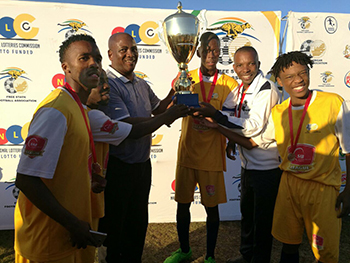Latest News Archive
Please select Category, Year, and then Month to display items
05 June 2018
Photo Supplied
 Archaeological excavations in the Wonderwerk Cave, north of Kuruman in the Northern Cape.
Archaeological excavations in the Wonderwerk Cave, north of Kuruman in the Northern Cape.
Research fellow Dr Lloyd Rossouw from the Department of Plant Sciences at the University of the Free State (UFS) recently published an article in the Nature Ecology and Evolution journal with Dr Michaela Ecker from the University of Toronto as lead author, and Dr James Brink, research fellow at the UFS Centre for Environmental Management. The findings described in “The palaeoecological context of the Oldowan-Acheulean in southern Africa” provides the first extensive paleoenvironmental sequence for the interior of southern Africa by applying a combination of methods for environmental reconstruction at Wonderwerk Cave, which have yielded multiple evidence of early human occupation dating back almost two million years ago.
Where water once was
The Wonderwerk Cave is found north of the Kuruman hills (situated in Northern Cape) a 140m long tube with a low ceiling. The surroundings are harsh. Semi-arid conditions allow for the survival of only hardy bushes, trees, and grasses. But during the Early Pleistocene, stepping out of the Wonderwerk Cave you would have been greeted by a completely different site, the researchers found. Using carbon and oxygen stable isotope analysis on the teeth of herbivores (Dr Ecker), fossil faunal abundance (Dr Brink), as well as the analysis of microscopic plant silica remains (phytoliths) excavated from fossil soils inside the cave (Dr Rossouw), the results show that ancient environments in the central interior of southern Africa were significantly wetter and housed a plant community unlike any other in the modern African savanna.
What difference does it make?
While East African research shows increasing aridity and the spread of summer-rainfall grasslands more than a million years ago, the results from this study indicate an interesting twist. During the same period, shifts in rainfall seasonality allowed for alternating summer and winter-rainfall grass occurrences coupled with prolonged wetlands, that remained major components of Early Pleistocene (more or less the period between one and two million years ago) environments in the central interior of southern Africa. That means our human ancestors were also living and evolving in environments other than the generally accepted open, arid grassland model.
UFS football team promoted to ABC Motsepe League
2017-06-01

The Kovsies were the best football team at the SAB
playoffs held in Sasolburg gaining access to the
ABC Motsepe League in 2017/2018.
Photo: Kyle Marais
It means a lot to the football loving community at University of the Free State (UFS) and gives them something to be proud of. This is according to Godfrey Tenoff, coach of the UFS Men’s Football Team, after his team’s recent promotion to the ABC Motsepe League.
The Kovsies were crowned SAB Provincial Champions, an amateur senior league, for a second consecutive year in 2016/2017, but gained access to the ABC Motsepe League by winning the SAB playoffs on 20 and 21 May 2017 in Sasolburg. Thabo (Number) Lesibe and Tenoff was also respectively named Player and Coach of the Tournament at the playoffs. The university has been promoted to the semi-professional ABC Motsepe league for the first time since 2008.
Flirting with success over past few years
Tenoff said UFS football can now be seen as “one that can make a significant contribution to championship culture of sport at the university”.
His troops had flirted with success over the past few years, but couldn’t always translate it into championships. They finished fourth in their SAB provincial league in 2013/2014, second in 2014/2015 and in 2015/2016 won the region, but lost in the SAB provincial playoffs.
Three reasons for outstanding season
Tenoff said there are three reasons for the team’s success and it went on a 22-game unbeaten streak, with 20 games won and two drawn.
They retained most players from the 2015/2016 season and many of them were recruited during that season. Local talent from high schools in Bloemfontein were also recruited and introduced earlier – in July 2016. Lastly, Tenoff said the players and technical team were resilient and objective in their planning.